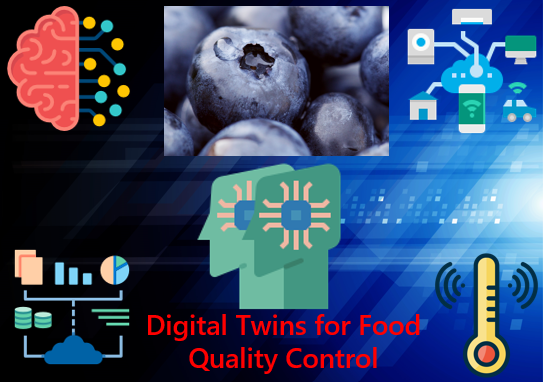Teaming for Interdisciplinary Research Pre-Seed Program
Precision in Food Supply Chains: The Digital Twin Approach

Precision in Food Supply Chains: The Digital Twin Approach

Digital technologies such as the Internet of Things (IoT), big data, artificial intelligence (AI), etc., provide a growing range of opportunities to transform the food system. An emerging area of research in this space is digital twin (DT), which connects physical and virtual worlds. While DT technologies are being trialed to enhance productivity in different disciplines, their applications in the agri-food sector are yet to be explored. The research aims to develop AI- based DT technology to predict blueberries’ quality and safety evolution from farm to retail. The AI-based model will utilize various input data sources, including planting details, weather conditions, greenhouse climate, light exposure, soil nutrients, and photosynthesis conditions in the canopy. We will collect this data by employing rapid IoT sensors such as NIR spectroscopy, hyperspectral imaging, and temperature/humidity monitors. The model’s outputs will encompass physico-chemical and microbiological data such as fruit size, weight, sugar content, firmness, color, microbial load, etc. We will validate this model, allowing us to understand how growing conditions and postharvest activities impact fruit quality, safety, and shelf-life. Additionally, we will establish parameterized life cycle analysis (LCA) models for the entire fruit supply chain. These models will consider the environmental impacts of agricultural production, transportation, storage, packaging materials, and contributions from retailers. Using the simulated fruit quality, we will develop a decision framework to make informed choices about the packaging and fruit conditions throughout the supply chain. This framework will leverage the predicted postharvest quality evolution from farm to retail. The digital twin will continuously monitor the fruit as it travels from the farm to the retailer by constantly receiving sensor data from various points in the supply chain and updating the LCA model. Towards the end of the supply chain, the packaging and material decision is re-evaluated. This reassessment accounts for any unexpected events, like travel delays or power outages, to gauge how much they have influenced the decision.
Team Lead
Christopher Kucha
ck87144@uga.edu
College: College of Agricultural and Environmental Sciences
Department: Food Science and Technology
Team Members
Anand Mohan
College: College of Agricultural and Environmental Sciences
Department: Food Science and Technology
Fanbin Kong
College: College of Agricultural and Environmental Sciences
Department: Food Science and Technology
Kaitlyn Casulli
College: College of Agricultural and Environmental Sciences
Department: Food Science and Technology
Joseph Usack
College: College of Agricultural and Environmental Sciences
Department: Food Science and Technology
Leonardo Bastos
College: College of Agricultural and Environmental Sciences
Department: Crop and Soil Sciences
Angelos Deltsidis
College: College of Agricultural and Environmental Sciences
Department: Horticulture
Mehmet Kurum
College: College of Engineering
Department: Electrical and Computer Engineering
